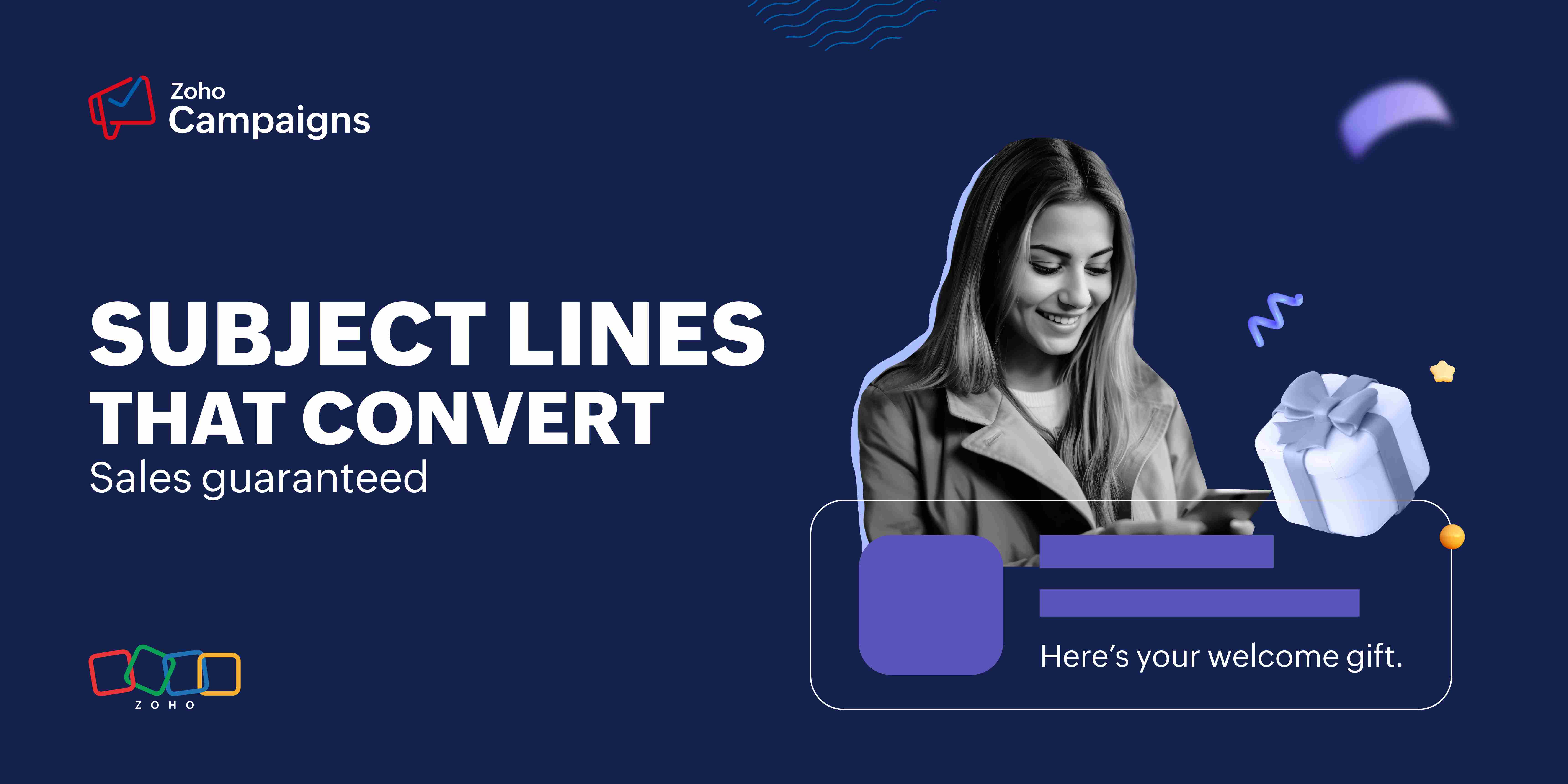- HOME
- Email Marketing
- The science of clicks: Unleash the power of psychology in your email subject lines
The science of clicks: Unleash the power of psychology in your email subject lines
- Last Updated : April 3, 2024
- 455 Views
- 7 Min Read

When you have written your headline, you have spent eighty cents out of your dollar. — David Ogilvy
This golden nugget of marketing wisdom hits the nail right on the head, especially when it comes to email subject lines. Let's be real for a moment: How often do you open an email without giving the subject line a once-over? Unless it's from your boss (because, priorities), that subject line better sing and dance to grab your attention.
Maybe we're overthinking it?
But are we putting too much stock in the power of subject lines? After all, if your emails consistently deliver value, won't your audience look forward to them, regardless of the subject line? If your content consistently delights, informs, or offers real value, your subscribers will notice. They might even start to seek out your emails, no matter what the subject line says.
But don't just ignore subject lines
This isn't to say subject lines don't matter at all. Subject lines are your one shot to grab attention in an inbox crammed with, well, everything. Studies have long touted the importance of a well-crafted subject line for boosting open rates. And it makes sense, right? How else will you get noticed in the chaotic marketplace that is one's email inbox? In the US alone, nearly 10 billion emails are sent daily. You might be the type who keeps their inbox pristine, or perhaps you're like me, with 9,248+ unread emails cluttering your digital space. The reality is we're bombarded with emails daily. For email marketers, the challenge is clear: Your email needs to be the first one opened, and for that a compelling subject line is your best tool.
So, have you ever wondered why some emails make you click faster than you can say "What's this about?" It's not always the offer inside that matters at first glance—it's how the message is conveyed. That's right, I'm talking about the science of leveraging human psychology to earn a definite click.
Think about it: What motivates you to open an email? Curiosity, urgency, the fear of missing out, or just the joy of discovering something new? These aren't just random emotions; they're powerful psychological triggers that, when tapped correctly, can transform your subject lines from ignorable to clickable.
So, how do you craft a subject line that's more enticing than a magician pulling a rabbit from a hat? The answer is simple: Apply a bit of psychology. Don't think of incorporating psychological principles into your subject lines as manipulation; it's about connecting in a way that aligns with your audience's natural desires and behaviors.
Psychology hacks to write click-worthy email subject lines
Spark interest with the promise of hidden knowledge (The curiosity gap)
We've all got a curious cat inside us that just needs to know everything. When an email teases us with a little mystery—like "The one ingredient your morning routine is missing"—it's exploiting the curiosity gap. It leaves a question dangling that our brains just need to answer.
Leverage the power of the crowd to build trust (Social proof and the bandwagon effect)
Remember being a kid and wanting that toy all your friends had? That's the bandwagon effect in action. When we see a subject line like, "See why 5,000 people are switching to our app," it's using social proof to tap into our desire to be part of the in-crowd. Nobody likes feeling left out.
Create cliffhangers that leave your audience wanting more (The Zeigarnik effect)
Our brains hate leaving things unfinished—that's the Zeigarnik Effect. Use this by creating a cliffhanger in your subject line, such as, "She never expected this on her vacation…." Suddenly, we're hooked and need to find out the rest of the story.
Invoke urgency to prompt immediate action (FOMO - fear of missing out)
No one likes to miss out on something great—a human trait we call loss aversion. A subject line like, "Your exclusive offer expires tonight!" makes us worry about missing out. So what do we do? We click, of course.
Give a little to get a lot—engage by offering value first (Principle of reciprocity)
When someone does something nice for us, we naturally want to return the favor. That's the principle of reciprocity. An email that offers something special, like "A gift for you inside," makes us more inclined to engage out of appreciation.
Personalize to stand out in a sea of information (Cocktail party effect)
Ever notice how you can hear your name even in a noisy room? That's the cocktail party effect. A subject line that personalizes, like "Lisa, here's your custom weekend playlist," feels like someone's talking directly to us amid the chaos of our inboxes.
Increase affinity through repeated brand exposure (Mere exposure effect)
Studies by Robert Zajonc in the 1960s showed repeated exposure to stimuli increases positive feelings towards them. Use your brand name or a familiar phrase in your subject lines to build trust and recognition.
Trigger immediate emotional engagement with impactful messages (Amygdala hijack)
Brain imaging research highlights the amygdala's role in processing emotions—particularly fear and reward. Craft subject lines that evoke positive emotions (excitement, joy) or negative emotions (fear of missing out) to trigger a response. (Ex: "Don't miss out on these amazing deals!")
Highlight the need for change by inducing psychological tension (Cognitive dissonance)
People seek consistency in their beliefs and actions. Dissonance occurs when these clash. Craft subject lines that highlight a gap between a recipient's current situation and a desired outcome to create a need for resolution. (Ex: "Feeling unproductive? Here's the fix!")
Other aspects to consider
Clarity vs. mystery
While curiosity can be a strong motivator, there's also a need to balance it with clarity. Subject lines need to be clear enough about the value proposition to avoid confusion or mistrust. A well-crafted subject line might combine both elements, offering a clear benefit while still invoking curiosity (Ex: "How to save on your next vacation: Secret destinations inside!").
Personalization and relevance
People are more engaged when something feels personally tailored to them. Using customer data to personalize subject lines—including names, past purchase behaviors, or locations—makes the email feel more relevant to the individual. This relevance taps into the psychological need for personalized experiences, increasing the likelihood of the email being opened. And personalized subject lines help increase open rates by 26%! There are no excuses not to personalize now!
Authority
People tend to trust authority figures or experts. Subject lines that suggest the content inside is endorsed by an expert or is from a credible source can increase trust and curiosity. For example, "Expert-approved winter skincare tips inside!" leverages authority to encourage opens.
Reward
The principle of reward is based on the idea that people are motivated by the promise of a benefit. Subject lines that suggest a direct benefit for opening the email can be highly effective. This could be as straightforward as offering a discount ("Unlock your exclusive 20% discount inside") or providing valuable information ("5 secrets to perfect home workouts revealed").
Priming
Exposure to certain words or concepts can unconsciously influence our thoughts and behaviors. Use positive priming words like "new," "improved," or "exclusive" to influence how recipients perceive your email.
Intriguing questions
Asking a compelling question makes us stop and think. Capturing someone's attention is all about piquing their interest and engaging their natural desire to solve puzzles. A subject line asking, "What does your dream vacation say about you?" gets us pondering and, more importantly, clicking.
Simple, actionable tips for crafting winning subject lines
Be clear, be bright
Sometimes, simplicity wins. A clear, direct subject line can be just as effective as a clever one.
Know your audience
Personalization goes a long way. Use what you know about your subscribers to make your subject lines resonate on a personal level.
Leverage the power of emojis
Emojis, when used sparingly and appropriately, can make your subject line stand out in a crowded inbox. They add a touch of personality and can convey emotions or offers visually. "👀 Sneak peek! 50% off summer must-haves " is more eye-catching and engaging than its plain-text counterpart.
Always use A/B testing
Experiment with different subject lines to see what works best. Data doesn't lie.
Keep an eye on trends
Stay updated with email marketing trends, but always filter them through the lens of what's best for your audience.
Build that relationship
Ultimately, your emails are a way to connect with your customers. Keep that connection strong by delivering consistent value, and your subject lines will be the cherry on top.
Some AI tools to help you generate great subject lines
Free options
- ActiveCampaign Free Email Subject Line Generator
- Copy AI Free Email Subject Line Generator
- YAMM AI Subject Line Generator
Paid options
- Encharge Free AI-powered Email Subject Line Generator (Offers a free trial)
- Mailmodo Free AI Email Subject Line Generator (Offers a free plan with limited features)
While subject line generators can be helpful for brainstorming ideas, remember that they shouldn't replace your own creativity and understanding of your audience. Use the generators as a starting point, then personalize and tailor the suggested lines to your specific email content and target recipients. The best way to stand out is to be genuinely you.
The final touch
Looking to make your emails impossible to ignore? It's all about nailing that perfect subject line, and Zoho Campaigns is here to help. With its easy-to-use A/B testing and comprehensive tracking reports, you can find out exactly what works best for your audience.
Zoho Campaigns gives you the power to refine your subject lines continuously and ensure your emails stand out and get opened. Start using Zoho Campaigns today to boost your open rates and take your email marketing to the next level. Ready to see the difference?



